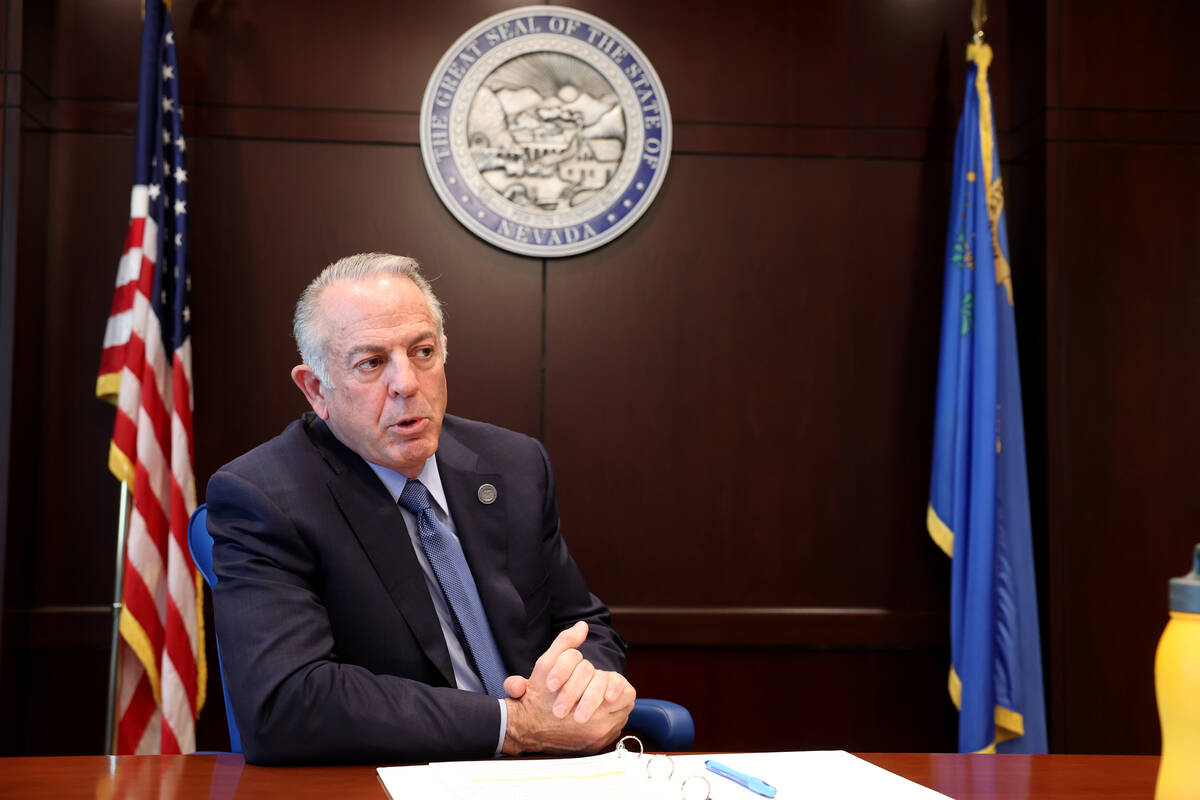Nevada’s governor vetoed 87 bills in 2025. Which lawmaker accounted for the most?
Nevada Gov. Joe Lombardo broke a record this legislative session, vetoing more bills than any other governor. But whose proposals met the veto pen most frequently?
Lombardo vetoed 87 bills that came out of the Democratic-majority Legislature, up from 75 in his first session. The 120-day session ended with the Republican governor rejecting legislation proposing IVF protections and restricting immigration enforcement in schools, among other policies.
The Las Vegas Review-Journal tallied veto statistics from each lawmaker using data provided by the Legislative Counsel Bureau and determined which 2023 vetoed policies were reintroduced this session to either be rejected again or, in the rare case, be written into law.
Fred Lokken, a political science professor at Truckee Meadows Community College, said the batch of vetoes, with their record-breaking numbers and repeated policy attempts, were not surprising given the partisanship in Carson City.
“I’ve always argued vetoes are a failure of government,” Lokken said.
Yeager has most vetoed bills
Speaker Steve Yeager had six bills vetoed by the governor, the most of any lawmaker — though 12 of his bills were signed into law. A number of other Democratic lawmakers had four of their bills vetoed, including Assemblymembers Max Carter and Sandra Jauregui, and state Sens. Skip Daly, Fabian Doñate, Dina Neal and Melanie Scheible.
Yeager said his veto total is higher when including two committee-sponsored bills that he championed.
The vetoed bills included major election reform proposals that would have allowed nonpartisans to vote in primaries, implemented voter ID requirements and established ballot drop boxes between early voting and Election Day.
Yeager said he was shocked the governor vetoed the voter ID bill because he and Lombardo had a one-on-one meeting to talk about the bill and address the governor’s concerns.
Lombardo also vetoed Yeager’s legislation requiring election officials to publish a downloadable list of all registered voters. Lombardo argued in his veto message that the bill poses a risk to voter privacy, though Yeager countered that the list included already-public information.
“I don’t understand why he vetoed any of those election bills,” Yeager said in an interview Wednesday.
Elizabeth Ray, a spokesperson for Lombardo, said in a statement the voter ID proposal was vetoed in part because “Democrats refused to include the provisions they discussed in meetings with the Governor.”
He argued that his bills — and other election-related legislation the governor vetoed — would have put in place processes to provide better information and better transparency for voters. Yeager said his legislation also would have made ballot boxes available between early voting and Election Day to help produce election results more quickly.
Yeager said that about 20 to 25 of the vetoes were probably predictable and were policies that Democrats and the governor were never going to agree on, but the rest “could have gotten there with better communication and if there was a mutual desire to work on those policies.”
“I said this in my response to his State of the State, half-jokingly, that there was no reason he needed to break his veto record,” Yeager said. “I just didn’t imagine that there really would be a scenario where he would break that veto record, so it’s pretty disappointing.”
Ray said the governor’s office was in “constant communication with lawmakers and legislative leadership.” She added that if legislators wanted to further consult with the governor’s policy team about a bill, “they had ample opportunity to do so during the 120-day legislative period and the 10-day veto determination window.”
Replays of 2023
Lawmakers re-introduced at least 11 bills that were vetoed in 2023, only for them to be vetoed again in 2025, according to data provided by Nevada Policy, a nonprofit conservative- and libertarian-leaning think tank.
Some of those repeat bills may have been reintroduced with the 2026 election in mind. Democrats used them to get Lombardo on the record on particular hot-button issues, Lokken said. The proposals and their vetoes now form a record both sides can point to when running for re-election.
Additionally, some lawmakers will continue to reintroduce the same or similar policies on their “pet issues” through multiple sessions because they have deemed it a personal or a constituent priority, Lokken said.
Such is the case for Jauregui, a survivor of the Route 91 Harvest festival shooting in 2017 who ran for office to advocate for gun control measures. Jauregui, the majority floor leader, re-introduced legislation that would have prohibited guns near an election site and would have prohibited a person under 21 from possessing a semiautomatic shotgun or semiautomatic centerfire rifle. Both included minor policy changes.
She also tried again to implement rent control for seniors or people on Social Security by prohibiting landlords from increasing rent by more than 5 percent from the prior year. She put forward similar legislation last year that would have prohibited landlords from increasing rent by more than 10 percent from the prior year. Jauregui did not return requests for comment about the vetoes.
For the second time, Lombardo vetoed a bill that would prohibit so-called “fake electors” from creating or serving in a false slate of presidential electors. State Sen. Skip Daly, D-Sparks, had put forward the bills in 2023 and 2025. The legislation was in response to six Nevada Republicans who submitted fake documents declaring Donald Trump as the winner of Nevada in the 2020 presidential election.
Daly called Lombardo’s veto “dishonest.” This year’s bill lowered the proposed criminal penalties from a four- to 10-year prison sentence to one to four years. It also removed a provision that would have banned fake electors from state and local government employment.
Daly modified the bill following the veto’s feedback in 2023, in which the governor called the presentation of fake electors a “terrible crime” but still criticized the bill’s penalties as harsh.
Lombardo’s veto message on this year’s bill called the legislation overly broad. He said it gave the secretary of state too much power to investigate fake elector schemes and that it could conflict with the First Amendment rights of someone circulating or signing a “symbolic or contingency slate.”
But the bill specified the crime would be for anyone who submits the false elector slate to certain state and federal government officials involved in certifying election results.
“I didn’t bring it just for the exercise,” Daly said in an interview Thursday. “I was trying to address the issues and trying to get something in the books specific to these events that happened.”
Daly said he did not expect to reintroduce the legislation next session unless another governor is elected.
Lokken said the veto likely had more to do with politics.
“I think it’s indicative of the partisan challenges in this Legislature,” he said. “The Democrats and Republicans have found very few things they can work on together and agree to.”
Different outcomes
But lawmakers did see some success in pushing forward bills that the governor previously vetoed.
He signed Assembly Bill 530, which continues fuel revenue indexing, a process that adjusts the fuel tax to keep transportation funding in pace with the rising cost of materials and labor, for 10 years.
In 2023, he vetoed a similar proposal, saying the indexing impacts household budgets and should be decided by voters. He also said the bill did not adequately address how to ensure that electric vehicle drivers contribute to road maintenance and construction costs.
Lombardo said when approving AB530 that the Legislature-led effort was not how he wanted the tax extended, but it was necessary to keep critical transportation projects and the jobs associated with them in place.
Lombardo also signed a bill requiring the state’s biggest cities and counties to incorporate protective heat measures into urban planning through AB96.
When Lombardo first vetoed a similar bill in 2023, he suggested there was a lack of evidence of development leading to higher temperatures, and he raised concerns about how such a bill could raise costs for local governments.
Lombardo was supportive of changes to the bill that clarified language about what is specifically required as components of heat mitigation plans, Ray, his spokesperson, previously told the Review-Journal.
Contact Jessica Hill at jehill@reviewjournal.com and McKenna Ross at mross@reviewjournal.com. Follow @jess_hillyeah and @mckenna_ross_ on X.


















